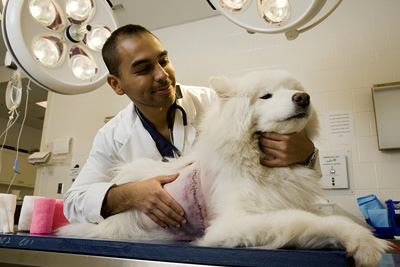Julio Lopez promotes Vet College student diversity
By Krishna Ramanujan

A passing encounter in a Los Angeles barbershop changed how veterinary student Julio Lopez '08 thinks about his heritage. While waiting for a haircut, a Latino middle school student noticed Lopez's undergraduate biology textbook peeking out of his bag and asked what school he attended. When Lopez, a Mexican-American, replied University of California-Los Angeles, the boy said, "Wow, you made it."
The boy was surprised, Lopez said, to find "someone who looks like me, who usually doesn't even finish high school, was actually in college. Knowing that I might have motivated someone to excel, especially from my own community, is a huge motivator for me." Ever since, Lopez said he has been mindful of how he can serve as an example for other Mexican-Americans and minorities to strive for their dreams.
Since leaving Los Angeles, however, Lopez said making a cultural adjustment has been one of the bigger challenges of life in Ithaca.
Lopez, a first-generation American who plans to specialize in small animal internal medicine, has compensated for the relative dearth of cultural variety in Ithaca by celebrating ethnic diversity at Cornell's College of Veterinary Medicine.
He has been a leader in the Veterinary College's student organization Veterinary Students as One in Culture and Ethnicity (VOICE), a group that celebrates student and faculty diversity at the Vet College through taste fairs with ethnic cuisine, salsa dance nights and more. The group also mentors undergraduate students about veterinary medicine as a career.
"When I first came to the Veterinary College I did not find the student body or faculty to be very diverse compared to inner-city schools, but when compared to other veterinary colleges, Cornell is one of the most diverse," said Lopez. With underrepresented minorities accounting for slightly more than 20 percent of the Veterinary College's student body, Cornell ranked third out of 28 U.S. veterinary colleges for this statistic in 2007, according to the Association of American Veterinary Medical Colleges.
As a member of VOICE, Lopez helped secure corporate funding from Pfizer Animal Health to make the group national. Using the donation as seed money, VOICE members have worked to add new VOICE chapters to 10 of the nation's 28 veterinary colleges, with plans to continue expanding the group.
Lopez's Mexican parents have been thrilled to watch their son become the first in their family to obtain a professional degree, Lopez said. Lopez said his parents "always put school number one" by stressing the importance of education.
Following graduation, Lopez will pursue an internship in small animal medicine at the California Animal Hospital in Los Angeles, working mainly with dogs and cats. The internship will entail regular rotations in surgery, cardiology, neurology and more. Once the internship is completed, Lopez will pursue a three-year residency, where he plans to specialize in internal medicine. Once board certified, he says he would like to "own my own practice or be an owner in a multipartner practice."
Of his Cornell experience, Lopez said highlights have included learning from a top-flight faculty. "To learn from them has been one of the reasons I came to Cornell," he said.
Media Contact
Get Cornell news delivered right to your inbox.
Subscribe